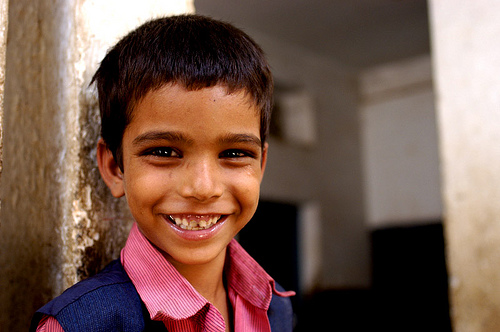Saving Face: Why Our Pupils Suffer For Our Honour

Via Youth Ki Awaaz
A little girl shivers with malaria in the late afternoon at school. Her teacher won’t send her home. Instead she beats the little girl with a wooden ruler to make her stop ‘deliberately shaking’ her hands. An 8-year-old boy in a municipal school in Mumbai passes out from hunger after the recess. His father has forbidden him from eating the khichdi (a nutritious mid-day meal of porridge) that is distributed for free as a mid-day meal by the Government. A 2nd grade teacher, now 14 years into her job, makes her students copy 10 random pages of their English text book every day. However, not a word of English will be spoken or listened to by her students in the entire academic year.What is common in these three examples? Children in India suffering at the hands of a callous system, you would probably say. Indeed, but investigate a little deeper, and a pattern emerges – a malaise that has devastated our children in the past, and has ominous portents for our future as a nation. In the first example, the teacher refused to acknowledge the illness of her pupil. If she did, it would have meant facing her total absence of knowledge on how to deal with medical emergencies, as well as exposing her unwillingness to go the extra mile in arranging for the student to receive medical attention. Allowing his son to eat the mid-day meal would mean letting the world know that this out-of-work father cannot make ends meet. Trying to teach basic phonics or reading to her 2nd graders would mean revealing the shocking truth for the 2nd grade teacher – that the teacher’s own English proficiency is at pre-kindergarten level. In each case, confronting the problem would involve those responsible for the students’ well-being to lose face. It is this very fear of losing face that has made our education system a minefield of insensitivity and lost opportunities.
So herein lies the paradox: A historically and culturally-sanctioned notion of respect and veneration for our gurus of yore, pre-empts expectations of accountability from our teachers in modern, contemporary India. We hesitate to make teachers responsible for pupil learning outcomes among their children because we are loath to de-sanctify their exalted status in our culture.
Our public primary education system caters to our most vulnerable children coming from what are considered the lowest strata of our highly power-distanced society. In an unfortunate double-whammy, these pupils are far, far likelier to spend many years with teachers who may disregard their basic duties, as compared to their more wealthy counterparts who go to private unaided schools. With every additional year that a vulnerable child spends in the ‘care’ of incompetent teachers, the achievement gap just widens further.
Question is, what can we do about it? As teachers and headmasters, we must see ourselves as truly responsible for the learning outcomes of pupils.
The winds of change have already begun to blow: the latest continuous comprehensive evaluation systems place an emphasis on learning through activities and a welcoming school environment, rather than the tyranny of final examinations. The day when the mindset of every public school teacher changes from that of an administrator to that of a change leader, will we do justice to the 600 million young minds hungering for knowledge and learning in our country today. Till then, we have the shame of the under-education, unemployment and under-achievement of our future generations on our hands. The choice is ours.
Read the entire article here.









